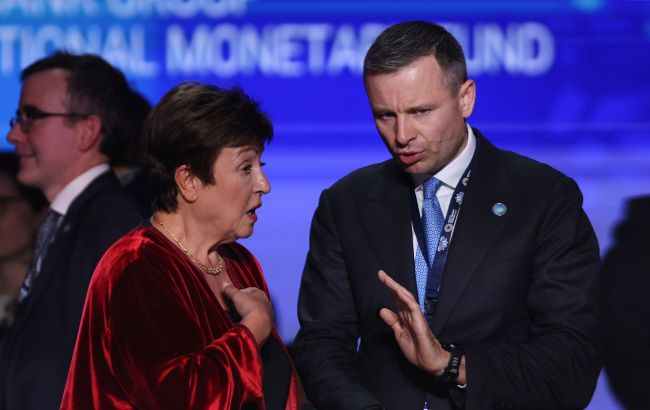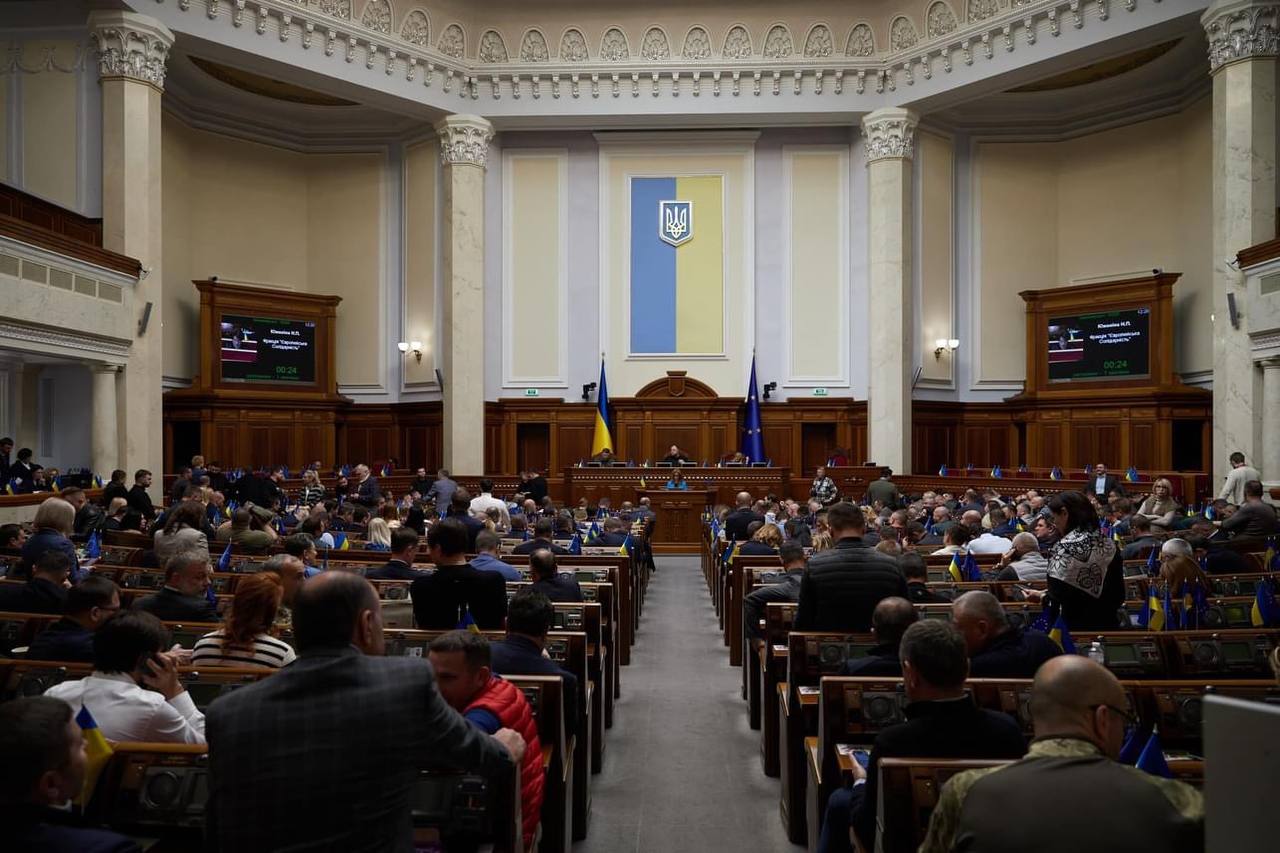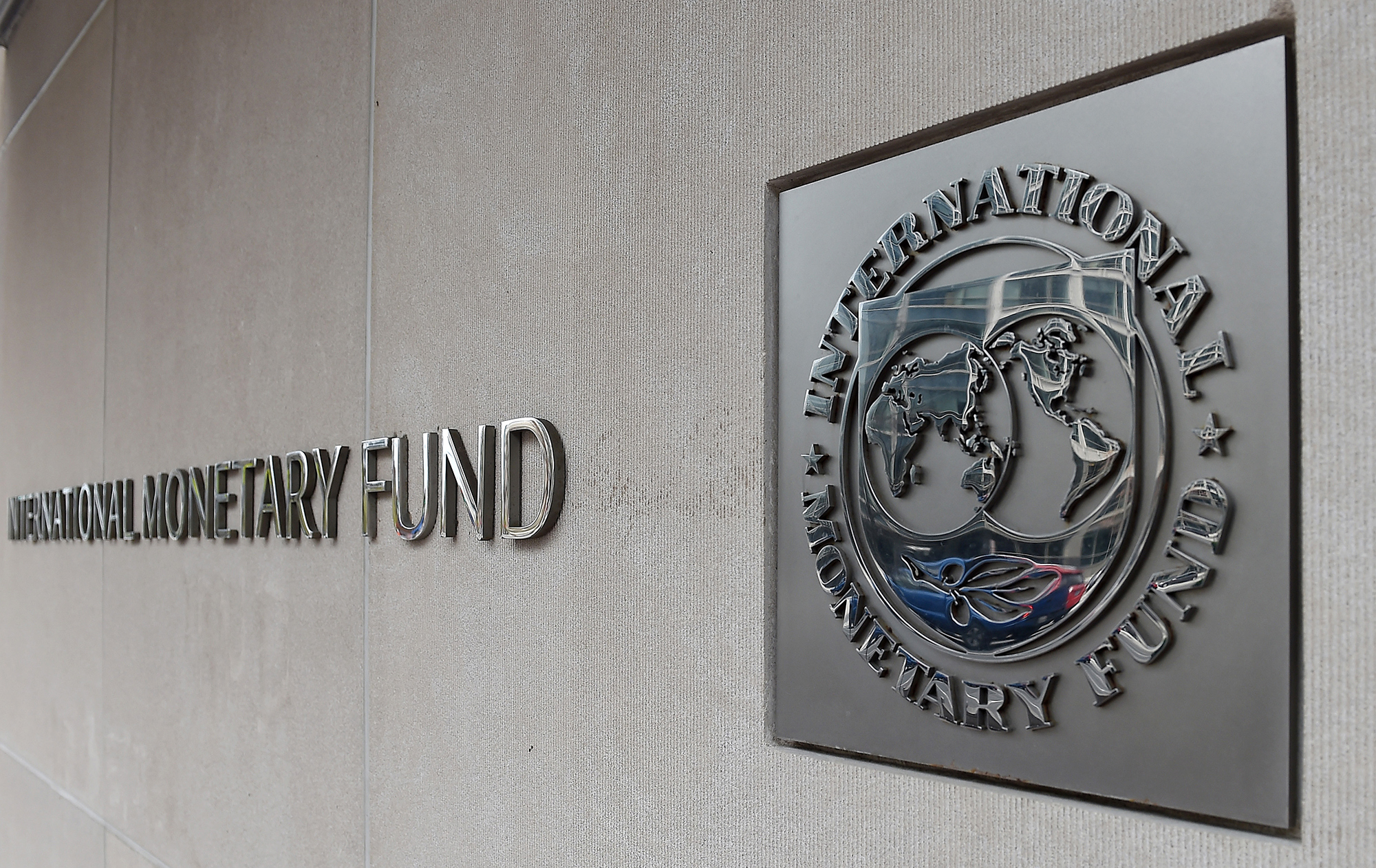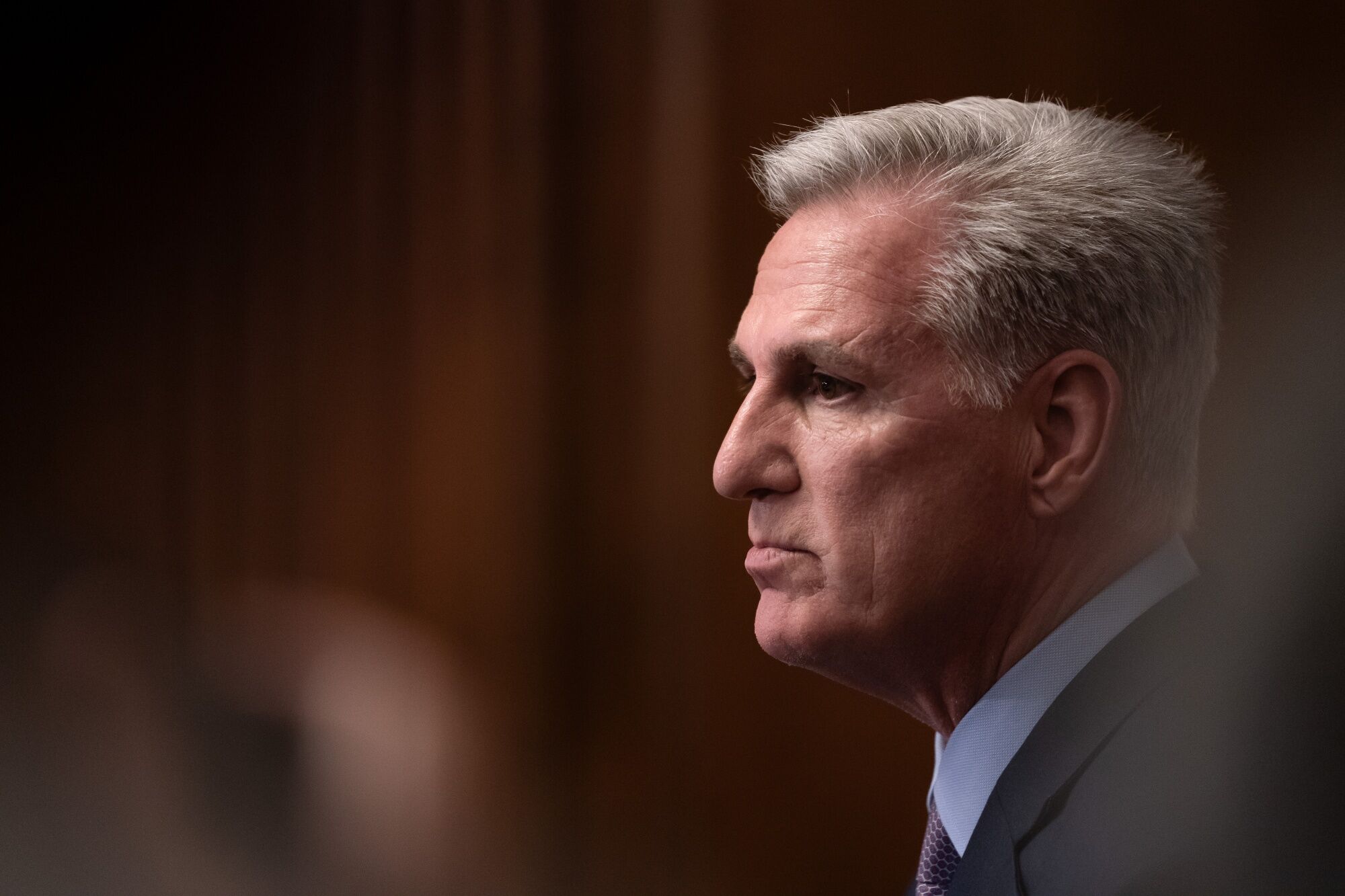What could derail new IMF tranche and how Ukraine plans to plug budget gap
 Ukraine's Minister of Finance, Serhii Marchenko, and IMF Managing Director Kristalina Georgieva (Photo: Getty Images)
Ukraine's Minister of Finance, Serhii Marchenko, and IMF Managing Director Kristalina Georgieva (Photo: Getty Images)
By the end of the year, an unprecedented event in the history of Ukraine's cooperation with the International Monetary Fund may occur. The disbursement of the next credit tranche may be delayed not due to Ukraine's failure to meet program conditions but because of the fault of international partners.
Official materials from the IMF and the Verkhovna Rada (Parliament - ed.) of Ukraine, as well as public and exclusive comments from officials and experts, were used during the preparation of this material, along with information obtained from officials under conditions of anonymity, articles by RBC-Ukraine.
The International Monetary Fund and Ukraine are preparing for the second review of the Extended Fund Facility (EFF) program, which is scheduled to take place in November.
In September, an expert mission from the IMF worked with representatives of the Ukrainian government. During this time, an analysis of the achievement of the financial and macroeconomic objectives of the program was conducted, and there was an agreement on the draft state budget for 2024 and a decision to change the exchange rate policy of the National Bank, introducing a managed flexible exchange rate.
The next stage is the mission to directly review the financing program. The start of its work has been slightly delayed due to the waiting for the adoption of the state budget law. After the Ministry of Finance submitted the bill to the Parliament on September 15, more than 1600 amendments were proposed by the deputies. So far, the document has been accepted in the first reading, but the head of the budget committee of the Verkhovna Rada, Roksolana Pidlasa, hopes that the overall budget for 2024 will be approved by November 10.
The IMF mission's work in Ukraine is planned for the first half of November, with the aim of reaching a staff-level agreement as the outcome. This will enable discussions on the disbursement of the third tranche, amounting to $900 million, to the IMF's board of directors in early December. At least, that's the perspective shared by Ukrainian representatives who were in contact with RBC-Ukraine.
Budget is a top priority
To implement these expectations, it is necessary to continue working on fulfilling certain conditions. First and foremost, it is essential to maintain the agreed-upon parameters of the 2024 state budget with the IMF. So far, the proposed amendments do not create a significant imbalance and are reportedly acceptable to the Ministry of Finance.
However, the question of the personal income tax from military personnel remains unclear – whether it will remain in local budgets, as before, or go to the central budget for 2024. Until the Parliament approves bill No. 10037, which transfers the military personal income tax to the state budget, the document is pending a second reading, which could take place in early November.
If the law is not adopted, the tax will remain in local budgets, and the deficit of the state budget will increase by nearly UAH 90 billion – from 20.4% of GDP to almost 21.6% of GDP. To cover the growing deficit, alternative sources will need to be found or other expenses will have to be reduced.

The Verkhovna Rada adopted the budget for the next year in the first reading (Photo: t.me/verkhovnaradaukrainy)
Furthermore, changing one of the main parameters of the budget, which is the deficit, will become an additional point of contention with the IMF and may complicate the negotiation process. However, officials in the government and the relevant committee of the Verkhovna Rada hope that lawmakers will support the Ministry of Finance's initiative, and it will be possible to allocate the personal income tax (PIT) to the state budget after reconsideration of the bill.
RBC-Ukraine reported in September that the redistribution of PIT would be one of the complex issues when approving the budget for 2024. The funds from this tax are planned to be directed toward the production of drones and ammunition for the army.
In any case, additional sources of financing for military expenses will be needed for the budget. Both government officials and experts confirm this. Oleksandr Parashchiy, the Head of the Analytical Department at Concorde Capital, is convinced that more funds will be required for military needs next year than in the current year, and they are not fully accounted for yet.
"So, in principle, for now, it can be said that the budget is not designed to cover both the cost of living and waging war next year but rather to meet the parameters agreed upon with the IMF at this stage," he stated in a comment to RBC-Ukraine.
Most challenging program benchmark met
As for the structural benchmarks needed to secure the next tranche, some of them have already been met, and those remaining should not pose significant problems, according to sources familiar with the negotiation process with the IMF.
The most challenging of the fulfilled benchmarks was the reinstatement of the lifelong financial monitoring of politically exposed persons (PEP). This provision was adopted in 2020, and in 2022, the lifelong monitoring period for PEP was replaced with a three-year period, which received criticism from international partners. As a result, the reinstatement of lifelong PEP status for financial monitoring according to FATF standards became one of the conditions for IMF financing.
Adoption of this law was inevitable, according to a source familiar with the negotiation process. "We had no chance not to accept it. All talk about the need to negotiate a three-year term was pure populism. We had no chance to establish any other conditions. This is a necessary condition to start negotiations on EU accession," the source said.
In addition, to receive the next IMF tranche, it is necessary to pass a comprehensive bill to reinstate tax audits. So far, the document has only been approved by the Rada in the first reading. However, RBC-Ukraine sources believe there should be no issues with this condition, and the audits will be reinstated within the agreed-upon timeframe. "We are making more or less normal progress on this issue, and there is nothing critical," a source stated.
Another condition is the appointment of a supervisory board for the Gas Transmission System Operator. According to the plan, the company was to be transferred under the management of the Ministry of Energy, a new charter for the GTS Operator had to be approved, and a new supervisory board had to be appointed by the end of October. So far, only the first condition has been met. The charter has not been adopted yet, but its draft has already been agreed upon with the Energy Community, as reported in an interview by Artur Lorkowski, the EC Director. The competition for selecting three independent candidates for the supervisory board is still ongoing, and according to the latest information, a shortlist for appointing members of the supervisory board by the Cabinet of Ministers is nearly ready. Government sources assured RBC-Ukraine at the beginning of October that the GTS Operator's supervisory board would be appointed by November.

The condition for the adoption of the law on strengthening the independence of the Specialized Anti-Corruption Prosecutor's Office (SAPO) does not currently fall under the second review of the program since the deadline for its implementation is the end of December. The draft law was approved by the government in mid-September. However, if the review of the program with the IMF is delayed for some reason, then meeting the condition regarding the SAPO may become relevant for receiving the next tranche.
There are no special risks in meeting the benchmarks for Ukraine to receive the third tranche of the IMF loan. However, a new risk of loan schedule disruption has recently emerged. It is not related to Ukraine but to international partners who essentially finance the state budget deficit.
IMF and USA - changing directions
Prior to the start of the full-scale war, the IMF was Ukraine's main creditor. Others, such as the USA and the EU, provided funds based on progress in the program with the IMF. In 2022, the situation has changed significantly. The IMF remains the reference point for other creditors, but their role in financing Ukraine's budget deficit has significantly increased. Currently, the IMF must align its actions toward Ukraine with the USA and the EU.
The state budget deficit for 2022 has increased significantly, reaching 26% of GDP. It is expected to be at the same level this year, and it may decrease to 20.4% in 2024. In nominal terms, this amounts to about $43 billion – a huge sum, covering mostly with EU loans and U.S. grants. Ukraine expects $5.4 billion from the IMF.
Currently, there are no guarantees that the funds from the EU and the USA will be provided in the expected volume and according to the previous schedule. The EU has promised to allocate 50 billion euros over 4 years, 39 billion of which are for covering the budget deficit. The budget draft for the next year includes an expected amount of 18 billion euros from the EU.
However, Brussels has agreed to allocate only 9 billion for now. Negotiations to double this amount are still ongoing. Deputy Minister of Economy Oleksii Sobolev confirmed this, stating, "We are currently working with the Europeans to ensure that out of these 39 billion, 18 billion will come specifically next year." The Ukraine Plan under which funding will be provided is expected to be prepared in December, and it will likely determine how much money from the EU will enter the budget next year.
USA as a risk factor in cooperation with the IMF
Uncertainty also exists with regard to the allocation of funds from the USA. Due to the current domestic political situation, decisions on financing Ukraine cannot be made at all.
"Right now, we are meeting the conditions of the IMF. But the program consists of two parts – commitments from the Ukrainian government and financial guarantees from our partners, without which the program will not work. Currently, our risks lean toward our partners due to what is happening in the USA," said a source who is familiar with the negotiation process for financing Ukraine.
Without external sources of income to cover a significant portion of the deficit, it is impossible to predict the situation for the next year. "If this source of funding is not available (or if it is not provided in full), the IMF will not have confidence that the country can meet its needs. There may be a problem with approving the next tranche if the issue is not resolved by December," the source pointed out.

The dismissal of Speaker of the House of Representatives Kevin McCarthy (in the photo) has led to a serious political crisis in the USA (Photo: Getty Images)
In Parashchiy's estimation, the problem is evidently serious, and the process of lending from the IMF could slow down. "The budget includes external borrowing of over 40 billion dollars. The sources are not clear yet – the IMF cannot handle such expenses, nor does it intend to. It is effectively refinancing Ukraine to repay past debts," emphasized the expert.
Oleg Ustenko, an economic advisor to the President of Ukraine, is confident that the IMF cooperation program will be extended. "At the moment, the program is critical not because of the amount of funds allocated, but because it is crucial for securing funding in other directions. This includes those necessary for the negotiation process regarding Ukraine's accession to the EU," Ustenko stated in a comment to RBC-Ukraine.
He noted that almost all the structural components of the IMF program focus on improving the business climate in the country, which is crucial for post-war development. "Among other things, fulfilling the established structural components will be an additional argument for ensuring sustainable funding from all of Ukraine's allies, including the USA," believes the President's advisor.
However, if the disbursement of the tranche is delayed due to uncertainty in funding from other partners, it will be the first case in the history of Ukraine's cooperation with the IMF when a program failure occurs not due to non-compliance with program conditions.

